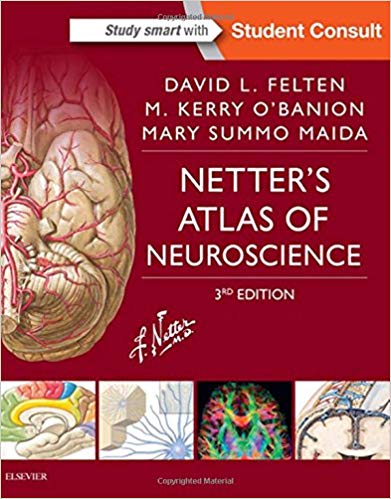
Ideal for students of neuroscience and neuroanatomy, the new edition of Netter’s Atlas of Neuroscience combines the didactic well-loved illustrations of Dr. Frank Netter with succinct text and clinical points, providing a highly visual, clinically oriented guide to the most important topics in this subject. The logically organized content presents neuroscience from three perspectives: an overview of the nervous system, regional neuroscience, and systemic neuroscience, enabling you to review complex neural structures and systems from different contexts.
You may also be interested in:
A companion set of flash cards, Netter’s Neuroscience Flash Cards, 3rd Edition, to which the textbook is cross-referenced.
- Coverage of both regional and systemic neurosciences allows you to learn structure and function in different and important contexts.
- Combines the precision and beauty of Netter and Netter-style illustrations to highlight key neuroanatomical concepts and clinical correlations.
- Reflects the current understanding of the neural components and supportive tissue, regions, and systems of the brain, spinal cord, and periphery.
- Uniquely informative drawings provide a quick and memorable overview of anatomy, function, and clinical relevance.
- Succinct and useful format utilizes tables and short text to offer easily accessible "at-a-glance" information.
- Provides an overview of the basic features of the spinal cord, brain, and peripheral nervous system, the vasculature, meninges and cerebrospinal fluid, and basic development.
- Integrates the peripheral and central aspects of the nervous system.
- Bridges neuroanatomy and neurology through the use of correlative radiographs.
- Highlights cross-sectional brain stem anatomy and side-by-side comparisons of horizontal sections, CTs and MRIs.
- Features video of radiograph sequences and 3D reconstructions to enhance your understanding of the nervous system.
- Student Consult eBook version included with purchase. This enhanced eBook experience includes access — on a variety of devices — to the complete text, 14 videos, and images from the book.
- Expanded coverage of cellular and molecular neuroscience provides essential guidance on signaling, transcription factors, stem cells, evoked potentials, neuronal and glial function, and a number of molecular breakthroughs for a better understanding of normal and pathologic conditions of the nervous system.
- Micrographs, radiologic imaging, and stained cross sections supplement illustrations for a comprehensive visual understanding.
- Increased clinical points — from sleep disorders and inflammation in the CNS to the biology of seizures and the mechanisms of Alzheimer’s — offer concise insights that bridge basic neuroscience and clinical application.

